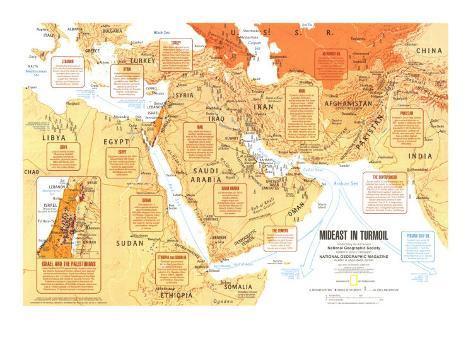|
|
features:
• Information about each country in the region
• Major cities and capitals noted
• Oil fields and pipelines
• Israeli settlements and refugee camps
• Details of crude shipments to the major consumers of oil, and ship routes (1980)
• Detailed inset of Israel and Lebanon |
|
|
|
(1980 information)
ISRAEL AND THE PALESTINIANS
Under the March 1979 peace treaty, Israel is returning the Sinai to Egypt and the two nations have opened formal communication. Israel has offered limited autonomy to the 1.2 million Palestinians of the West Bank and Gaza, but insists on security control. The Palestine Liberation Organiation (PLO) demands full statehood and abolition of the State of Israel, which now has 3.7 million people. Of the world's four million Palestinians, 15 percent remain in refugee camps.
LIBYA - Libya's erractic dictator Muammar Qaddafi preaches worldwide revolution, opposes peace talks with Israel, and threatens to cut off Libyan oil to the United States.
EGYPT - Egyptians cheered the 1979 peace treaty with Israel, but their resulting isolation from the rest of the Arab world has aggravated such problems as housing shortages and high food prices.
LEBANON - Despite the presence of U.N. and Arab peacekeeping forces, recurring violence has marred a four-year-old truce between Israeli-supported Christian rightists and Palestinian-backed Muslim leftists.
SYRIA - Antigovernment terrorism spread into urban riots in March 1980 as merchants, professionals, and Sunni Muslim scholars joined in opposing policies of President Hafe al-Assad's regime, controlled by Alawite Muslims.
TURKEY - Allies have pledged some three billion dollars in aid to help this NATO member recover from more than two years of economic chaos and fighting between rightist and leftist factions. For six years Turkish troops have controlled northern Cyprus.
IRAQ - Iraq, which put down a Kurdish rebillion in the mid-1970s, has skirmished with Iran since late 1979, Baghdad claims Arab ownership of three Persian Gulf islands by Iran in 1971 and backs autonomy demands by the Arabs of Iran's oil-rich Khuzestan Province.
IRAN - Powerful clerics such as Ayatollah Khomeini – whose word has the force of government – leftist groups, and Western-educated moderates vie for control of the revolution that toppled the shah in 1979. Virtually every ethnic minority in Iran, demanding greater independence, has battled government forces. A U.S. commando mission April 24-25, 1980, failed to rescue American hostages taken in Tehran November 4, 1979.
AFGHANISTAN - Backed by the Soviet troops, Babrak Karmal took power December 27, 1979 from another pro-Moscow regime. Soviet forces pured in to combat a two-year-old anti-Communist revolt by Afghan Muslims.
PAKISTAN - President Zia ul-Haq, whose governemnt takeover in 1977 ended a bitter war with the Baluch minority, lost popularity in 1979 when his predecessor, Zulfikar Ali Bhutton, was executed. More than a million Afghan refugees have added to the country's economic difficulties.
THE YEMENS - Yemen's Saudi-supported regime has revived merger negotiations with Soviet-dominated Democratic Yemen, after a brief border war in early 1979.
SAUDI ARABIA - On November 20, 1979, several hundred Muslim zealots, supporting a self-proclaimed savior, seized the Sacred Mosque of Mecca, Islam's holiest shrine, and held it for two weeks.
PERSIAN GULF OIL - Tankers haul some 18 million barrels a day–about 30 percent of world production–from the Persian Gulf. Japan and Western Europe, even more than the U.S., rely on this now for their oil.
ETHIOPIA & SOMALIA - Ethiopian government troops fight guerrillas in secessionist Eritrea Province and Somali-backed rebels in the Ogaden. More than a million Ogaden refugees, mostly women and children, have fled to Somalia.
SUDAN - This nation of 17 million people strains to accommodate some 500,000 refugees from wars in Ethiopia, Uganda, Zaire, and Chad. Some are resettled on farmlands, but the majority, facing hunger and disease, languish in camps.
THE SUPERPOWERS - Soviet and U.S. maneuvering in the Arabian Sea region is underscored by arms, advisers, and economic aid. The U.S.S.R. and its allies Cuba nd East Germany support regimes in Ethiopia and Democratic Yeman with weapons and personnel. The U.S.S.R. has air and naval access in both countries. The U.S., a major arms supplier whose warships patrol the Arabian Sea, is negotiation for similar access to Somalia, Oman, and Kenya.













